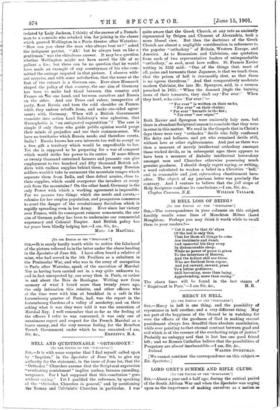HELL AND QUESTIONABLE " ORTHODOXY."
[To THE EDITOR OF THE "SPECTATOR."]
SIR,—It is with some surprise that I find myself called upon by " Inquirer," in the Spectator of June 8th, to give my authority for the statement, in the issue of June 1st, that the - Orthodox " Churches assume that the Scriptural expression "everlasting punishment" implies useless, because unending, vengeance. For I had supposed that this conclusion " goes without saying." Yet I qualified the reference, by speaking of the * Orthodox Churches in. general," and by mentioning the Roman and Calvinistic Churches in particular. I was
quite aware that the Greek Church, at any rate as anciently represented by Origen and Clement of Alexandria, took a more liberal view. But then the doctrines of the Greek Church are almost a negligible consideration in references to
the popular " orthodoxy " of Britain, Western Europe, and America. As to Romanism and Calvinism, one quotation from each of two representative leaders of unimpeachable " orthodoxy," as such, must here suffice. St. Francis Xavier writing in 1552 said " One of the things that, most of all, pains and torments these Japanese, is that we teach them that the prison of hell is irrevocably shut, so that there is no egress therefrom." And that comparatively moderate modern Calvinist, the late Mr. Spurgeon, said, in a sermon preached in 1855: "When the damned jingle the burning irons of their torments, they shall say For ever ! ' When they howl, echo cries For ever !
" For ever" is written on their racks,
" For ever" on their chains; " For ever " burneth in Om fire ; " For ever " ever reigns.'"
Both Xavier and Spurgeon were eminently holy men, but there is abundant Scriptural reason to conclude that they were in error in this matter. We read in the Gospels that in Christ's days there were very "orthodox" devils who fully confessed His deity and holiness, and yet who remained devils still,
without love or other righteousness. And just as there was then a measure of merely intellectual orthodoxy amongst these wicked devils, so in subsequent ages there appears to have been a measure of diabolic intellectual heterodoxy amongst men and Churches otherwise possessing much genuine goodness. I should deeply regret saying, or writing, a word calculated to weaken a belief in a Christian hell," and in reasonable and just, reformatory chastisement here- after. The object of my previous letter was precisely the contrary. And I venture to believe that the full scope of Holy Scripture confirms its conclusions.—I am, Sir, &c.,










































 Previous page
Previous page